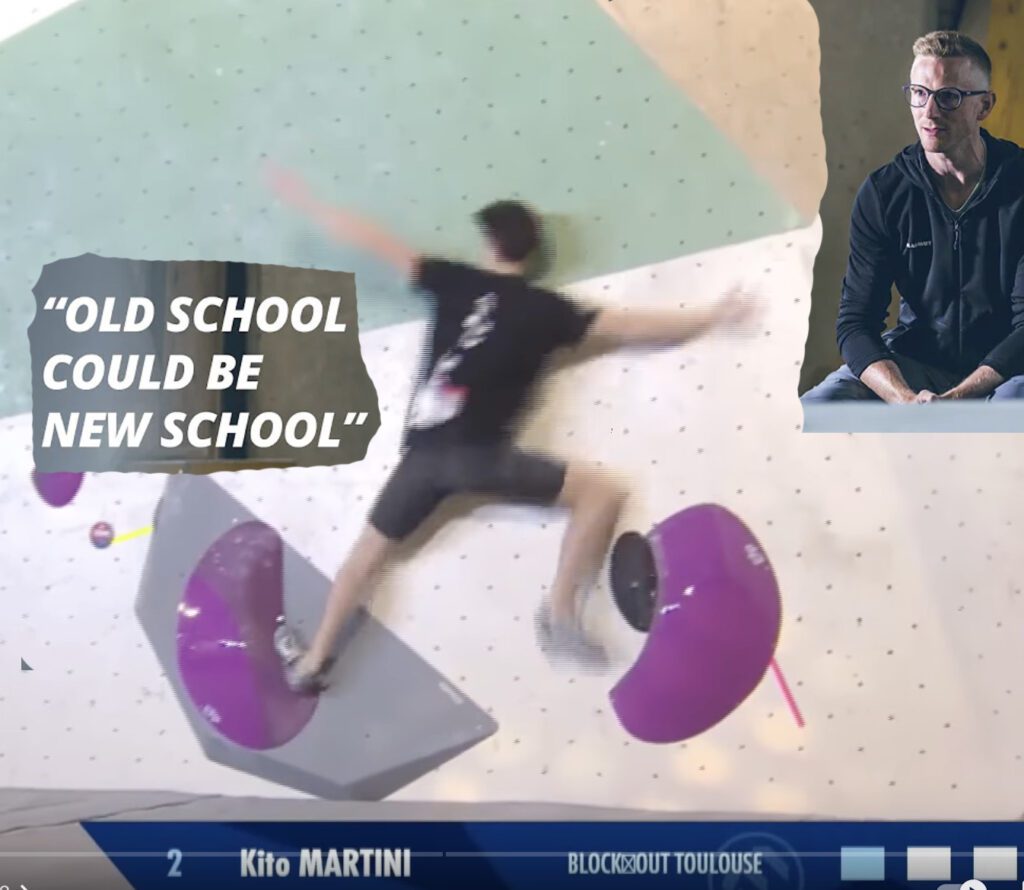Campionati francesi: oltre il concetto di coordinativo!
Quanto dovrebbero essere grandi le sale per ospitare boulder cone questi? Dove sta andando il bouldering di competizione?
“Old school could be new school”, ma non oggi e soprattutto non oggi in Francia. È disponibile su YouTube uno dei filmati di scalata oggettivamente più divertenti degli ultimi anni, anche perché è depurato dei tempi morti in cui gli atleti della finale del campionato francese di Boulder restano fermi a riposare, riflettere, spazzolare il percorso su cui subito dopo dovranno non scalare ma svolazzare.
Se guardiamo questo video con lo spirito di chi ammira su Instagram le gesta spericolate e apparentemente impossibili degli atleti di parkour, si passa davvero una mezz’ora abbondante di puro divertimento, perché Mawem, Schalk, Avezou e soprattutto il vincitore inaspettato Kito Martini sono vestiti da arrampicatori, hanno le scarpette da arrampicata, ma forse avrebbero potuto scalare meglio e con più certezza di non farsi male con scarpe da ginnastica opportunamente gommate per fermarsi, ogni tanto, sui volumi. tra un decollo l’altro.
Insomma quanto si è visto in una delle più importanti gare europee di boulder di quest’anno va in direzione esattamente contraria a quanto ha chiesto e proposto Jakob Schubert recentemente in una lunga intervista, anche questa disponibile su YouTube; intervista un cui Jacob ha pregato chiaramente, e chiaramente a nome di tanti altri atleti di altissimo livello di tutto il mondo, di recuperare il senso del rock climbing all’interno delle gare di lead e di boulder. Un tornare alle origini, un recuperare il valore dell’allenamento sulle dita e sulle braccia rispetto alla dominanza attuale dei problemi di puro swing, che vanno oltre il concetto di coordinativo. La gara in questione è andata ben oltre il concetto di coordinativo, entrando appieno nel territorio che congiunge l’uomo al macaco, animale che vive sugli alberi e non sulle rocce, perchè se fosse sempre così le future gare di bouldering potrebbero essere una estensione del tree-climbing, superando definitivamente il free-climbing.
Ripetiamo, divertente, in alcuni momenti proprio emozionante in un crescendo di allontanamento progressivo dal concetto di scalata, allontanamento culminato nel blocco 4, che Martini ha flashato in venti secondi come un primate che si sposta sulle liane.
E’ stata anche la gara che forse ha chiesto più spazio nella storia del climbing: blocchi larghi ben oltre i cinque metri per consentire lanci laterali che non si erano mai visti altrettanto lunghi in una gara internazionale. Facile immaginarseli trasportati tout court nelle nostre sale affollate di gente che aspetta il proprio turno…
Chapeau a Kito Martini per aver fatto mangiare la polvere a due maghi dello swing come Schalk e Mawem, ma ha dimostrato quanto è vero quello che diceva Jakob nell’intervista: c’è una fluttuazione esagerata dei risultati, specie in campo maschile: un giorno vinci, una settimana dopo puoi uscire persino dalla semifinale se non imbrocchi lo zompo da un volume all’altro. In nessun altro sport il risultato è più influenzabile da chi prepara la gara (da noi sono i tracciatori a poterlo fare) in favore di un atleta piuttosto che di un altro.
E questo, aggiungiamo noi, è un fattore che va mitigato perché lo sport stesso sia credibile.

english
“Old school could be new school”, but not today and especially not today in France. One of the objectively funniest climbing videos of recent years is available on YouTube, also because it is free of the dead time in which the athletes of the French Bouldering Championship final remain still to rest, reflect, brush the route on which they will immediately have to not climb but flutter.
If we watch this video with the spirit of those who admire the reckless and apparently impossible feats of parkour athletes on Instagram, we really spend a good half hour of pure fun, because Mawem, Schalk, Avezou and above all the unexpected winner Kito Martini are dressed as climbers, they have climbing shoes, but perhaps they could have climbed better and with more certainty of not hurting themselves with appropriately rubberized gym shoes to stop, every now and then, on the volumes. between one take-off and the next.
In short, what we saw in one of the most important European bouldering competitions this year goes in the exact opposite direction to what Jakob Schubert recently asked and proposed in a long interview, also available on YouTube; an interview in which Jacob clearly prayed, and clearly on behalf of many other top-level athletes from all over the world, to recover the sense of rock climbing within lead and bouldering competitions. A return to the origins, a recovery of the value of training on the fingers and arms compared to the current dominance of pure swing problems, which go beyond the concept of coordination. The competition in question went well beyond the concept of coordination, fully entering the territory that connects man to the macaque, an animal that lives in trees and not on rocks, because if it were always like this, future bouldering competitions could be an extension of tree-climbing, definitively overcoming free-climbing. Let’s repeat, funny, at times really exciting in a crescendo of progressive distancing from the concept of climbing, a distancing that culminated in block 4, which Martini flashed in twenty seconds like a primate moving on lianas.
It was also the competition that perhaps asked for the most space in the history of climbing: blocks well over five meters wide to allow lateral throws that had never been seen so long in an international competition. It’s easy to imagine them transported tout court to our gyms crowded with people waiting their turn…
Hats off to Kito Martini for leaving two swing wizards like Schalk and Mawem in the dust, but he showed how true what Jakob said in the interview is: there is an exaggerated fluctuation in results, especially in the men’s field: one day you win, a week later you can even be eliminated from the semifinal if you don’t hit the jump from one volume to the other. In no other sport is the result more influenced by those who prepare the race (in our country the routesetters can do it) in favor of one athlete rather than another.
And this, we add, is a factor that must be mitigated for the sport itself to be credible.


Comments are closed.